CO2 Hydrates for Carbon Sequestration
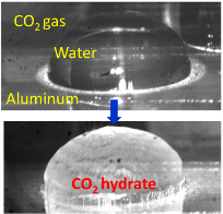
Our group is working on novel methods to accelerate formation of CO2 hydrates (compounds of water and CO2, which form at high pressure and low temperature) for carbon sequestration applications.
Electrically Tunable Boiling Heat Transfer
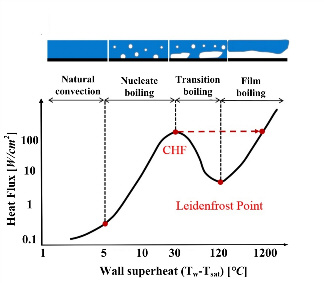
Boiling heat transfer has enormous impact in areas such as electronics cooling, desalination and steam generation. In practice, boiling heat transfer is limited by the formation of a vapor layer at the solid-liquid interface (Leidenfrost effect).
Freezing - Hydrates and Ice
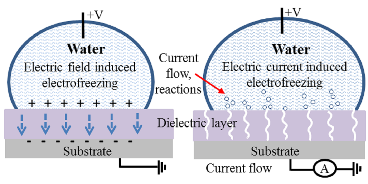
Control of nucleation of ice and hydrates has many practical applications in the areas of power generation, oil and gas and infrastructure. Our recent efforts are targeted at isolating the effects of surface chemistry, fluid composition and electric fields on the nucleation kinetics of ice and methane hydrates.
Producing Water from Waste Gas (Oilfields, Landfills)
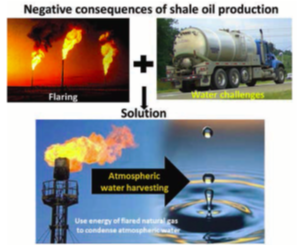
Our group is working on multiple approaches to use waste natural gas from oilfields and landfills to produce water. Technical and techno-economic analysis have been conducted for novel approaches on waste-to-value conversion.
Electrical Heat Pipes for Extended Distance Heat Transport
Current electronics cooling strategies are quickly becoming insufficient to meet the ever-growing needs of technology. Heat pipes are advantageous because they operate passively by cyclically evaporating and condensing a working fluid, but they are limited by the maximum fluid velocity their internal wick can sustain.
Thermal Management of Electronics
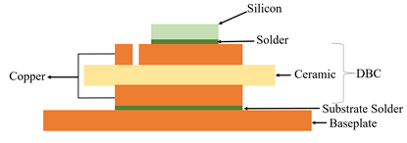
Our group is working on novel methods and materials to enable disruptive advancements in heat dissipation from electronics packages and heat generating components.
Machine Learning for Thermal Fluid Systems
Use of machine learning for thermal-fluids applications can result in transformative benefits, yet it has been vastly under-explored. Our group is exploring the use of machine learning-based algorithms and statistical modeling as alternatives for physics-based models for complex, multiphysics problems.
Controlling Wettability in Oil-Water Systems
Our group is working on control and enhancement of wettability in oil-water systems using electrowetting, surfactants, and surface texturing.
Condensation Heat Transfer
Our group is working on enhancing dropwise condensation heat transfer by accelerating droplet growth and condensate removal using electrowetting.